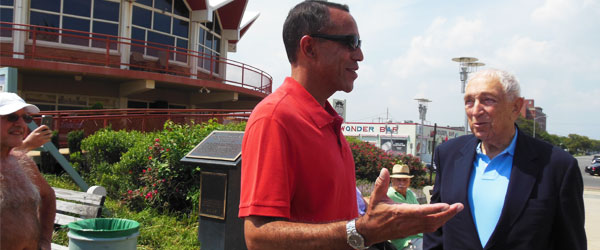Legislators rally against offshore drilling
'Romney wants to put his mitts on our shore and we don't want them'
Legislators tackled shore-specific issues at a press conference held today on the boardwalk.
Offshore drilling and water-quality legislation known as the BEACH act were the topics at hand for Sen. Frank R. Lautenberg [D-NJ] [above, right] and Rep. Frank Pallone [D-NJ-6] [right]. They were joined by Mayor Ed Johnson [pictured above, left], Deputy Mayor John G. Loffredo and Surfrider Foundation member John Weber.
MID-ATLANTIC OFFSHORE DRILLING
Lautenberg and Pallone also discussed offshore drilling in the mid-Atlantic region, which presumptive Republican presidential nominee Mitt Romney endorsed earlier today in New Mexico.
“Romney wants to put his mitts on our shore and we don’t want them,” Lautenberg said.
Pallone said the coastline was “under assault.”
“To open up the coast of New Jersey and the mid-Atlantic to offshore drilling is a huge mistake,” he said. “There’s not much reserves out there and it’s a real risk.”
THE BEACH ACT
“The ocean Franks,” as Weber referred to the lawmakers, authored the BEACH [Beaches Environmental Assessment and Coastal Health] act in 2000, and it was approved unanimously in both the House and the Senate. The act established water-testing procedures for coastal communities. In New Jersey, water-testing information can be found at njbeaches.org.
Prior to the BEACH act, New Jersey tested its waters while neighboring states did not, Lautenberg said.
“We were at a distinct disadvantage because we would look very carefully at water quality and our neighbors nearby would ignore that and invite people to come no matter what the water quality was,” Lautenberg said. “We wanted to be on equal footing.”
Despite having “some of the cleanest waters in the country,” New Jersey beaches saw 131 closures last summer due to environmental reasons, Lautenberg said. “As long as pollution is still a reality, people deserve to know whether beaches are safe.”
Lautenberg and Pallone are now pushing for funding of the BEACH act. The $10 million required annually to fund the mandate was not included in President Barack Obama’s budget this year, Pallone said. “So we have been working very hard to make sure the appropriation bills are passed and continued resolutions are passed so that it has funding.”
They also hope to re-authorize the BEACH act with some changes, which include more rapid testing. With current testing techniques, “you might not know until 24 hours after the test takes place whether the ocean water quality is safe,” Pallone said. “People could theoretically be swimming in water where they shouldn’t be.”
New technology could cut the wait time down to six hours, Pallone said.












